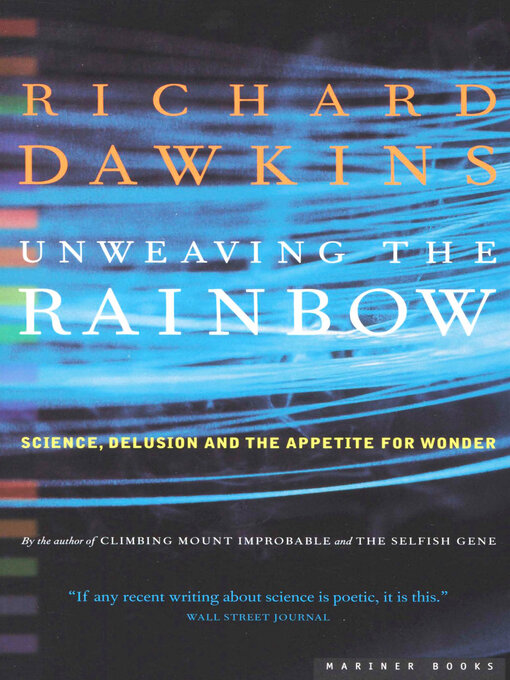Did Sir Isaac Newton “unweave the rainbow” by reducing it to its prismatic colors, as John Keats contended? Did he, in other words, diminish beauty? Far from it, says acclaimed scientist Richard Dawkins; Newton’s unweaving is the key too much of modern astronomy and to the breathtaking poetry of modern cosmology. Mysteries don’t lose their poetry because they are solved: the solution often is more beautiful than the puzzle, uncovering deeper mysteries. With the wit, insight, and spellbinding prose that have made him a bestselling author, Dawkins takes up the most important and compelling topics in modern science, from astronomy and genetics to language and virtual reality, combining them in a landmark statement of the human appetite for wonder.
This is the book Dawkins was meant to write: A brilliant assessment of what science is (and isn’t), a tribute to science not because it is useful but because it is uplifting.
“A love letter to science, an attempt to counter the perception that science is cold and devoid of aesthetic sensibility . . . Rich with metaphor, passionate arguments, wry humor, colorful examples, and unexpected connections, Dawkins’ prose can be mesmerizing.” —San Francisco Chronicle
“Brilliance and wit.” —The New Yorker
-
Creators
-
Publisher
-
Release date
October 9, 2018 -
Formats
-
Kindle Book
-
OverDrive Read
- ISBN: 9780547347356
-
EPUB ebook
- ISBN: 9780547347356
- File size: 1774 KB
-
-
Languages
- English
-
Reviews
-
Publisher's Weekly
November 30, 1998
Keats complained that Newton's experiments with prisms had destroyed all the poetry of the rainbow. Not so, says Oxford biologist Dawkins (The Selfish Gene) who, in an eloquent if prickly defense of the scientific enterprise, calls on the "two cultures" of science and poetry to learn from each other. Yet Dawkins cautions against "bad poetic science," i.e., seductive but misleading metaphors, and cites as an example " `Gaia': the overrated romantic fancy of the whole world as an organism," a hypothesis proposed by atmospheric scientist James Lovelock and bacteriologist Lynn Margulis. Dawkins (continuing a celebrated battle that has been raging in the New York Review of Books) also lambastes paleontologist Stephen Jay Gould for "bad poetry," rejecting Gould's theory of punctuated equilibrium, which holds that new species emerge during relatively short bursts of evolutionary advance. In these conversational, discursive essays, Dawkins is, as always, an elegant, witty popularizer, whether he is offering a crash course in DNA fingerprinting, explaining the origins of "mad cow disease" in weird proteins that spread like self-replicating viruses or discussing male birdsong as an auditory aphrodisiac for female birds. However, in venturing into realms beyond the immediate purview of science, he reveals his own biases, launching into a predictable, rather superficial assault on paranormal research, UFO reports, astrology and psychic phenomena, all of which he dismisses as products of fraud, illusion, sloppy observation or an exploitation of our natural appetite for wonder. Dawkins is most interesting when he theorizes that our brains have partly taken over from DNA the role of recording the environment, resulting in "virtual worlds" that alter the terrain in which our genes undergo natural selection. Agent, John Brockman. 50,000 first printing; first serial to the Sciences.
-
Formats
- Kindle Book
- OverDrive Read
- EPUB ebook
subjects
Languages
- English
Loading
Why is availability limited?
×Availability can change throughout the month based on the library's budget. You can still place a hold on the title, and your hold will be automatically filled as soon as the title is available again.
The Kindle Book format for this title is not supported on:
×Read-along ebook
×The OverDrive Read format of this ebook has professional narration that plays while you read in your browser. Learn more here.

